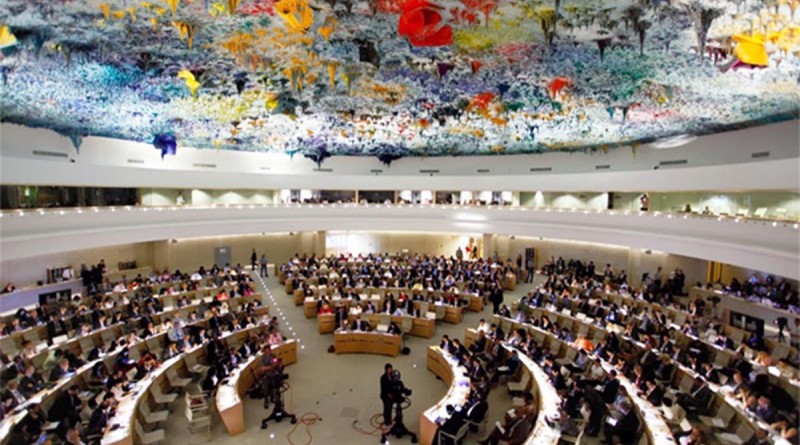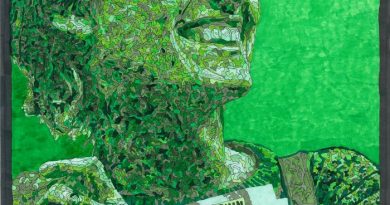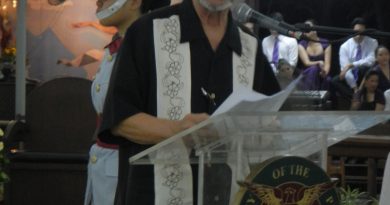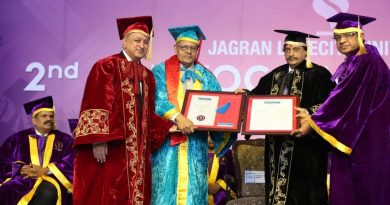Nonkilling progress at the 59th session of the Human Rights Council
The 59th session of the Human Rights Council ended a few days back and we are already preparing for the next ones. We care to keep you updated on the works of the Council, your council, the council of the people and on our contributions therefore.
The June session is always dedicated mainly to gender issues. As a result, it is no less than five resolutions out of 26 dedicated to the topic that have been adopted; two on economic empowerment, one on genital mutilation, one on the renewal of the mandate of the working group on gender discriminations and a new one on women and sports as vectors of equality and grounds for the progress of human rights. During a special panel on women and peacemaking, Elina Viitasaari, our CGNK’s gender focal point, insisted on the importance of directly addressing trauma in conflict, in post-conflicts situations and wherever needed.
Christophe Barbey, our main representative in Geneva, intervened during a special meeting with the Secretary General’s Special Adviser on Genocide. Mentioning the glacier that wholly fell on a Swiss village on the 28th of May, he insisted on the possible links between climate change and genocide. The Special Adviser, Madam Gamba recognized climate change as being one of the early warning signs to be followed, as a possible trigger of genocides.
During the Universal Periodic Reviews of human rights in all countries (14 at each session), he recalled the urgent need for Angola and Madagascar to ratify the genocide convention. Noteworthy, El Salvador has been able to curb its homicide rate from 100 or more deaths for 100’000 inhabitants, to less than 3 in a couple of years. Sadly, this major achievement has not been done without some questionable human rights issues (too many arrests of innocents and reports of cruel, inhuman or degrading treatment ), so he also called to a shift from successfully resisting a killing plague to creating a more serene and peaceful society, at a happy living level for all.
In Gambia, the criminal code has recently been changed and – it is still to be confirmed, but most likely suicides will be decriminalized there. He recalled how criminalization impedes the duty to prevent and the right to seek help.
Finally, for San Marino, a notably nonkilling country, he called for even more valuation of life and for the establishment of an “enjoyment of life and nonkilling day on 28th of June, Glenn Paige’s birthday”.
The session was dominated by heavy economic issues, limitations to the number of meetings and reports provided for by the United Nations infrastructures due to the so called “liquidity crisis”; some big countries are late on paying their dues to the United Nations. Some use this misappropriate economic means to restrain the activities of the UN, including human rights. Humanity is immensely rich, wealth of course, knowledge indeed, people of goodwill, profound heart and sound minds always. The budget of the UN is minimal: 9 billion $ yearly. Compare this to military spending 2.718 billion, or to the budget of Switzerland 85 billion (without local states and cities) and though the United Nations could do more for peace and wellbeing, surely if more countries were willing to reach such quality of life, it surely does “much with little” but were a “little more could do much more”. It is time for humanity to put the money where it is needed the most, for its survival and for the good of all people.
Preparing for the future of human rights everywhere, we made Universal Periodic Review submissions for countries that will pass in front of the Council for their review next year. Mauritania, Micronesia, Nauru, Oman, Sao Tomé e Principe, Saint Kitts and Nevis, Saint Lucia all need to ratify the Genocide Convention while Nepal has been on our list ever since in our first contribution 10 years ago. For all of them we acknowledge progress made and make kind suggestions for concrete improvements of life and peace, both in policies and in results, always or most often calling for greater people’s participation in public affairs.
Please note or remember that we are mostly volunteering for this work; more volunteers are welcome and economic contributions help us to make ends meet. Thank you!
This world is ours to preserve and enjoy!
The text of all our reports, submissions and declarations at the UN can be found on our UN-nonkilling web page. The oral declarations can be viewed on UNwebTV and through the following links:
- Panel on Women and peacemaking, Elina Viitasaari
- Dialogue with the Special Adviser on Genocide
- Universal Periodic Review: El Salvador (last speaker of the meeting)
- Universal Periodic Review: The Gambia
- Universal Periodic Review: San Marino
- Universal Periodic Review: Angola
- Universal Periodic Review: Madagascar (French and English)




